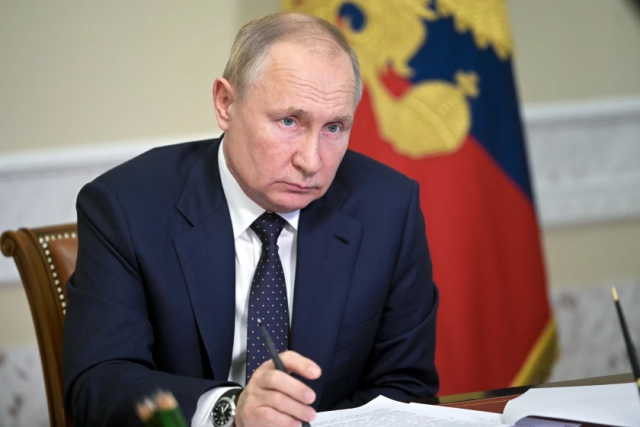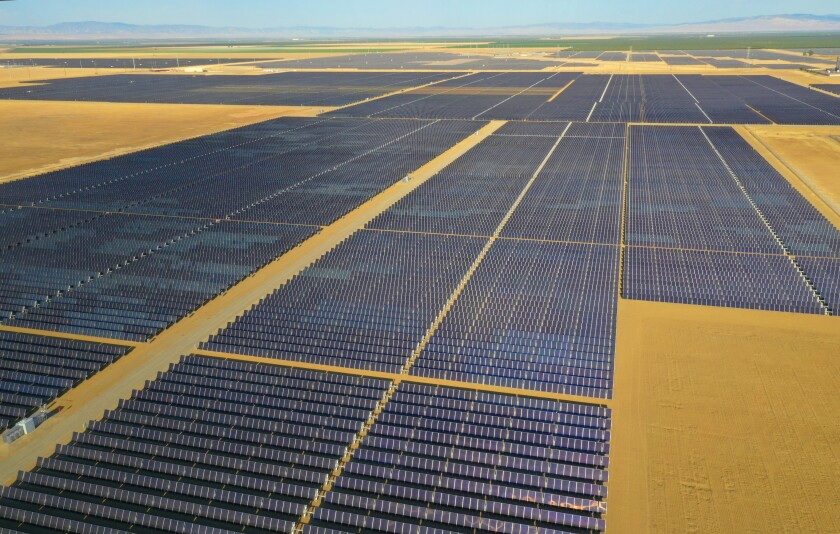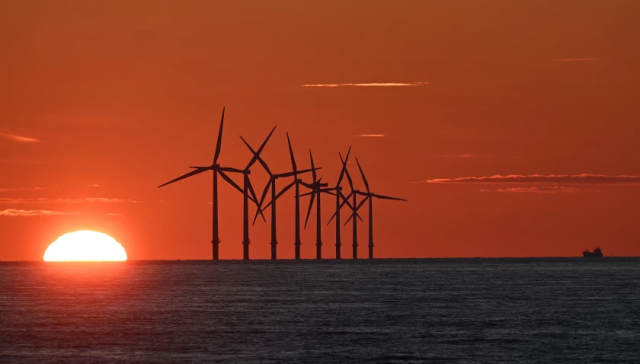NEWS One way to combat Russia? Move faster on clean energy
Sammy Roth — February 26, 2022 — Los Angeles Times
Direct link: https://www.latimes.com/business/story/2022–02-26/one-way-to-combat-russia-move-faster-on-clean-energy
When a geopolitical crisis sent gasoline prices skyrocketing four decades ago, President Carter called on Americans to achieve “energy independence” from Middle Eastern oil exporters. He installed solar panels on the White House, donned a cardigan sweater to stay warm and took steps to boost domestic oil production.
Russia’s invasion of Ukraine has again upended global energy supplies, threatening to raise gas prices that are already higher than ever in California. The U.S. oil industry wants President Biden to ease restrictions on drilling, and Europe has already started importing more fossil fuel from the United States to reduce its dependence on Russian supplies.
But doubling down on oil and natural gas isn’t the answer, some security experts say — and neither is energy independence.
The war in Europe adds to the urgency of transitioning to clean energy sources such as solar and wind power that are harder for bad actors such as Russia to disrupt, those experts say. The conflict also highlights the importance of the U.S., the European Union and other allies working together to confront the climate crisis while taking global security into account.
“There’s been a lot of concern about dependence on Russian [natural] gas, and whether that inhibits countries’ ability to stand up to Russia,” said Erin Sikorsky, director of the Washington, D.C.-based Center for Climate and Security. “The more that countries can wean themselves off oil and gas and move toward renewables, the more independence they have in terms of action.”
It’s also important to remember that climate change poses a major national security threat, with the Defense Department and other federal officials warning last year that worsening climate-fueled hazards are likely to drive a surge in global migration, stoking political instability. That helps explain why the U.S. Army released its first-ever climate strategy this month, setting a goal of slashing its planet-warming emissions in half and powering all bases with climate-friendly electricity by 2030.
Sikorsky pointed out that Defense Secretary Lloyd J. Austin III has called China the “pacing threat” for the U.S., meaning it poses greater systemic challenges than any other nation. The climate emergency, Sikorsky said, is America’s “shaping threat.”
“It is shaping everything in the background now that the United States is dealing with,” she said.
Even before Russian President Vladimir Putin launched his attack on Ukraine this week, European nations were making plans to cut their reliance on energy exports from Russia. The country supplies more than one-quarter of Europe’s oil and nearly 40% of its natural gas, a different planet-warming fuel used for heating and electricity generation.
But Russian aggression has sped up the E.U.’s plans. European officials are expected to release a strategy next week for reducing the continent’s use of fossil fuels by 40% over eight years, and ramping up non-polluting energy sources.
It’s a plan designed to slow the climate crisis, which is wreaking havoc around the world by exacerbating wildfires, floods, droughts and heat waves. But cutting back on fossil fuels would also help to limit Russia’s geopolitical influence.
UC Berkeley energy professor Daniel Kammen — who previously served as science envoy for then-Secretary of State John F. Kerry — lamented that Europe “has clearly needed higher motivations than climate change to cut the Gordian gas knot with Russia.” But if Russia’s invasion of Ukraine pushes the E.U. to act, he said, it could be a silver lining to an otherwise tragic situation.
“For all we talk about how inexpensive renewables are, and how quickly energy storage is coming down in price, that hasn’t been enough when it appears that ‘just’ the climate is at stake,” Kammen said. “Now European sovereignty is at stake.”
Still, there’s no guarantee Europe will follow through on its latest climate commitments. Even if the geopolitical crisis underscores the benefits of shifting to renewable energy, it could also distract global leaders from the longer-term climate crisis.
And in the meantime, one of Europe’s strategies for dealing with constrained Russian gas supplies and rising prices during the last few months has been importing more liquefied natural gas from the United States. It’s an option made possible by fracking, which opened up “shale plays” in regions such as west Texas and made America the world’s largest oil and natural gas producer.
“Putin hates U.S. shale because of the influence it gives the U.S. and the world, and the flexibility it gives us,” said Daniel Yergin, a Pulitzer Prize-winning oil historian and vice chair of research and consulting firm IHS Markit.
Twenty-seven Republican senators made a similar demand in a letter to Energy Secretary Jennifer Granholm last week, calling U.S gas exports “a dependable source of energy and a reliable alternative to strategic competitors like Russia.”
But those steps would carry long-term climate consequences,spewing more heat-trapping pollution into that atmosphere. They’re also unlikely to result in new energy supplies coming online quickly enough to make a meaningful difference in Europe.
“API’s answer for all of the world’s problems is to remove constraints on domestic oil and gas production,” said David Victor, an international relations professor at UC San Diego. “It’s just a very well-rehearsed argument.”
And if Europe follows through on commitments to ratchet down fossil fuel combustion — perhaps by investing in green hydrogen or long-duration batteries — the U.S. could also reap the benefits, Victor said. That’s because California and other states, like Europe, have a growing need for clean power sources that can keep the lights on when the sun isn’t shining and the wind isn’t blowing. European investments to scale up those early-stage technologies could help drive down costs for everyone.
“The technologies that are going to be used — whether it’s electrolyzers for hydrogen or fuel cells that use hydrogen for heavy trucks — these are all global,” Victor said. “Those economies [of scale] are just massive. That’s how solar got cheap.”

Calls for energy independence, Victor added, “often end up backfiring, because we benefit from a global technology marketplace.”
At the same time, bulking up domestic supply chains could help the U.S. shield itself against price swings and geopolitical conflict — particularly when it comes to lithium and other minerals needed for clean energy technologies such as batteries.
Just this week, Biden joined with Gov. Gavin Newsom to announce a $35-million contract with a Las Vegas company that operates the nation’s only rare-earth mine in the California desert. Biden and Newsom also discussed federal support for lithium production at the Salton Sea, in Southern California’s Imperial Valley, which has been described as the “Saudi Arabia of lithium.”
Boosting domestic production of critical minerals could help combat Russian influence, since Russia is a leading producer of metals including copper and nickel — a reminder that even the clean-energy economy isn’t immune from bad actors.
At the same time, the idea of energy independence is “somewhat dangerous, because it offers you a false sense of security,” said Sarah Ladislaw, a managing director at the think tank RMI. The reality, she said, is that the U.S. will need to find ways to work with Russia and other nations to slash climate pollution, even as it strives to diversify its own clean energy supplies.
“You have to be sensitive to your energy vulnerabilities and have contingency plans in place,” said Ladislaw, who previously led the energy security and climate change program at the Center for Strategic and International Studies.


You must be logged in to post a comment.